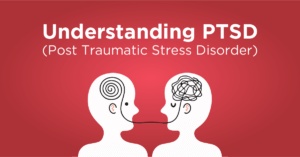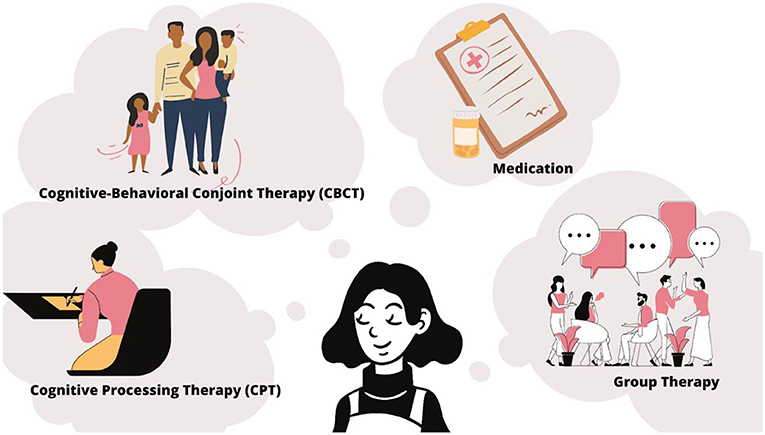It’s no secret that post-traumatic stress disorder (PTSD) can have a devastating effect on people who experience traumatic events. But what causes PTSD? And why do some people develop it after exposure to a single event, while others don’t? In this blog post, we will explore the PTSD causes and discuss the factors that contribute to its development. We will also offer advice for those who are struggling with PTSD.
What Is PTSD?
 PTSD is a mental health condition that’s triggered by a terrifying event — either experiencing it or witnessing it. Symptoms may include flashbacks, nightmares, and severe anxiety, as well as uncontrollable thoughts about the event.
PTSD is a mental health condition that’s triggered by a terrifying event — either experiencing it or witnessing it. Symptoms may include flashbacks, nightmares, and severe anxiety, as well as uncontrollable thoughts about the event.
Most people who go through traumatic events have difficulty adjusting and coping for a while. But with time and good self-care, they usually get better. If you continue to have symptoms for more than a few months and they’re affecting your day-to-day life, you may have PTSD. PTSD is a real illness. It’s important to get help if you think you have it.
Causes of PTSD

There are many causes of PTSD, but the most common is exposure to a traumatic event. Some of these are:
Trauma
Trauma is a term used to describe a deeply distressing or disturbing event. This can be an isolated incident, such as a car accident, or ongoing, like exposure to domestic violence.
Traumatic events can also include natural disasters, like earthquakes or floods. They can be man-made, like war or terrorism. And they can even be something that happens to you personally, like sexual assault. There may also be a genetic component to PTSD. Researchers are looking into whether certain genes make people more susceptible to developing the disorder.
Abuse
Abuse is another common cause of PTSD. This can be physical, sexual, or emotional abuse. It can happen in childhood or adulthood. Abuse can also be witnessed, such as seeing a loved one being abused.
PTSD can also develop after a loss, such as the death of a loved one. This is known as complicated grief. And it can occur after other types of losses, such as losing your job or your home.
Serious Accidents
In life, there are some things that we just can’t control. And sometimes, bad things happen to good people. Serious accidents, like car accidents or train wrecks, can be very traumatic. If you’ve been in a serious accident, you may have PTSD.
Medical Procedures
For some people, even medical procedures can be traumatic. This is especially true for procedures that are done without your consent, such as surgery or a biopsy. But it can also be true for procedures that are done with your consent but are still painful or scary, like childbirth.
Diagnosis of a Life-Threatening Illness
A diagnosis of a life-threatening illness can also be traumatic. This includes conditions like cancer, HIV/AIDS, and multiple sclerosis. Also, if you’re a caregiver for someone with a life-threatening illness, you may be at risk for PTSD. Sometimes, just knowing that someone you love is sick can be enough to trigger the disorder.
Genetics
Genetics can play a role in PTSD. If you have a family member with PTSD, you may be more likely to develop the disorder yourself. This suggests that there may be a genetic component to the disorder. Researchers are still working to identify specific genes that may be involved.
Brain Chemistry
Brain chemistry may also be a factor in PTSD. Certain chemicals, like serotonin and norepinephrine, help regulate mood. An imbalance of these chemicals has been linked to depression, anxiety, and other mental health disorders. It’s possible that an imbalance of brain chemicals plays a role in PTSD as well. Brain-imaging studies have shown that the brains of people with PTSD look different than the brains of people without the disorder.
Stress
Stress is a normal part of life. But when you’re constantly under stress, it can take a toll on your mental and physical health. Chronic stress can make you more susceptible to developing PTSD. This is especially true if you’ve experienced trauma in the past. Many of the causes of PTSD are also sources of chronic stress. These include abuse, poverty, and discrimination. It can be hard to avoid chronic stress, but there are things you can do to manage it.
Bullying
Bullying is also a common cause of PTSD. This can happen in childhood or adulthood. Bullying can be physical, emotional, or even cyberbullying. If you’ve been a victim of bullying, you may be at risk of developing PTSD. There are also other risks associated with bullying, such as anxiety and depression.
Pregnancy and Childbirth
For some women, pregnancy and childbirth can be very traumatic experiences. This is especially true if there are complications during pregnancy or childbirth. If you’ve had a difficult pregnancy or delivery, you may be at risk of developing PTSD. Some studies have even found that women who have had multiple miscarriages are at an increased risk of the disorder.
How To Treat PTSD?

Treatment of PTSD can be difficult, and often requires a combination of medication and therapy. The most important thing is to get help from a professional who can tailor a treatment plan to your individual needs.
There are three main types of treatment for PTSD:
Medications
Antidepressants, anti-anxiety medications, and sleep aids can be helpful in managing the symptoms of PTSD. Medications are also often used to treat co-occurring conditions, such as depression or anxiety.
Psychotherapy
Cognitive-behavioral therapy (CBT) is the most common type of psychotherapy for PTSD. CBT can help you understand how your thoughts and beliefs about the trauma are affecting your feelings and behavior. It can also help you learn new coping skills.
Eye movement desensitization and reprocessing (EMDR) is a newer type of therapy that has shown promise in treating PTSD. EMDR may be especially helpful if you have difficulty talking about the trauma.
Other types of therapy, such as art therapy or music therapy, can also be helpful in managing symptoms of PTSD.
Support Groups
There are many different types of support groups for people with PTSD. Some groups are focused on specific traumatic events, such as combat trauma or sexual assault. Others are geared toward general support.
Finding a group that is a good fit for you can be helpful in your recovery.
There are many different types of treatment available for PTSD, and the best approach depends on your individual needs. If you think you might have PTSD, please seek professional help.
MantraCare is a platform that helps you connect with mental health professionals who specialize in treating PTSD. With MantraCare, you can easily find a therapist who is right for you and book an appointment online. If you or someone you know is struggling with PTSD, please reach out for help. There are many resources available to support you in your recovery.
Conclusion
PTSD is a serious condition that can develop after a person experiences or witnesses a traumatic event. While the exact cause of PTSD is not known, it is believed to be the result of a combination of biological and psychological factors. Treatment for PTSD often includes therapy and medication. With proper treatment, many people with PTSD are able to recover and live normal, productive lives.
If you or someone you know has experienced a traumatic event and is showing signs of PTSD, it’s important to seek professional help. Early diagnosis and treatment can make a big difference in the severity of symptoms and the length of time it takes to recover. While there is no sure way to prevent PTSD, there are things that can be done to reduce the risk.
For more information, please contact MantraCare. PTSD or Post-Traumatic Stress Disorder is a mental health condition that affects people who have experienced or witnessed a traumatic event. If you have any queries regarding Online PTSD Counseling experienced therapists at MantraCare can help: Book a trial PTSD therapy session


